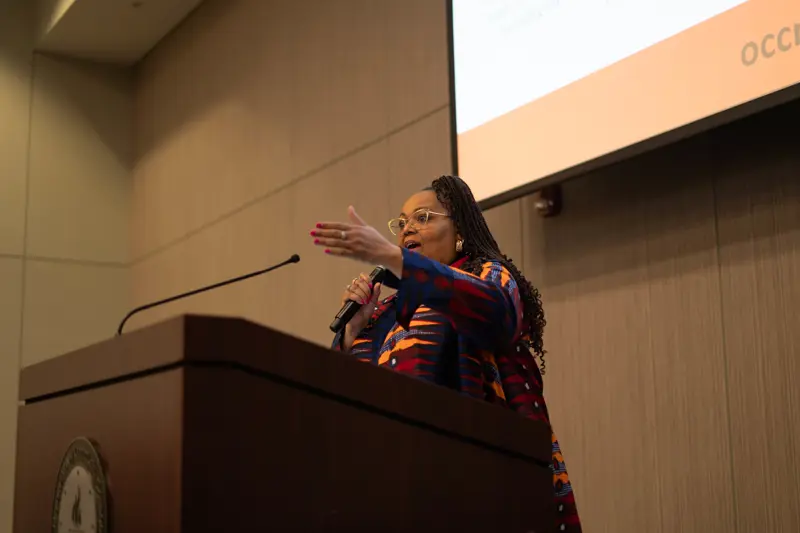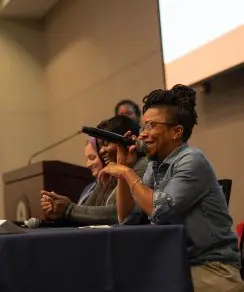On March 1, 2024, OCCRL held its Equity Academy at Moraine Valley Community College. The event continues a long tradition in which OCCRL harnesses the collective efforts of passionate speakers and engaged participants. This year’s Equity Academy focused on creating and sustaining equitable outcomes for students. It featured an empowering, humorous keynote speaker, esteemed presenters, and enthusiastic panelists.
Most participants consisted of career and technical education faculty and staff from the Workforce Equity Initiative. Four presentations and two training sessions aimed to foster open discussions around student belonging and shared experiences among participants from various community colleges across Illinois.
Jennifer Foster, executive director of the Illinois Community College Board, gave a welcome speech to start the day. Following Foster’s talk, the first session included four presentations held concurrently. The first presentation was conducted by Dr. Chequita Brown, an OCCRL affiliate member, and H.M. Kuneyl, an OCCRL research assistant. Dr. Brown’s presentation explored the correlation between the sense of belonging, student engagement, and student support among students who have had foster care experience in the context of Illinois community colleges. The session focused on students' experiences, needs, and voices, helping attendees understand the unique challenges they face. The session prioritized effective implementation strategies to improve sense of belonging on campus for this population of students, with the goal of increasing academic and social success.
During the second presentation, Nina Owolabi, an OCCRL senior research assistant, and Aidana Sirgebayeva, an OCCRL research assistant, shared insights on the experiences of student parents in community colleges. Despite the mission of community colleges to serve diverse student populations, student parents continue to face several challenges related to access and completion. The presenters discussed recent literature in the field and shared findings from their studies on student parents. One participant said this session was particularly useful since many of their students were parents.
During the third presentation, Dr. Oliver Tapaha shared his personal story as a Diné (Navajo) scholar. He talked about the challenges he faced in his personal and professional life while living outside the Diné reservation and attending predominantly white institutions. Dr. Tapaha highlighted the cultural resilience strategies he used to overcome adversity and thrive in 21st-century American society. His story reflected four strategic areas for being culturally resilient: familial support, cultural teachings, spirituality, and sacred Diné terms.
Numerous participants found Dr. Tapaha’s session useful, with one participant saying, "It helped me see the obstacles and challenges many Black male students experience on our campus."
Another participant, a first-generation Mexican American, said, "I found this most relevant as I transitioned to the community college arena, where I still find bias and barriers toward advancement and opportunities."
Dr. Tapaha's compelling narrative exemplifies the transformative potential of creating equitable outcomes for students in navigating systemic inequities, resonating profoundly with the Equity Academy's overarching theme of creating and sustaining equitable outcomes for student belonging from orientation to employment.
OCCRL staff affiliate member Dr. Osly Flores and senior research assistant Jewel Bourne led the Program Review Illinois peer-reviewer training session, which was designed for practitioners who had completed an application and were invited to participate in the pilot for the peer-review initiative for Illinois Statewide Program Review. The participants will engage in continued professional development in preparation to conduct and complete peer reviews for the state’s annual program review submission.
The training highlighted the purpose of program review, a brief history of program review in Illinois, tools for conducting quality peer reviews, and practice conducting peer reviews across the peer-review sections. The peer review initiative pilot is designed to provide community college practitioners and faculty who complete program review with real-time feedback to guide and implement evidence-based practices, in an effort to produce increased equitable outcomes for learners in the state.
Another session, led by Dr. Asif Wilson, an OCCRL affiliate member and an associate professor of Curriculum & Instruction at Illinois, discussed justice-centered teaching and leading in today's contexts of opportunity and systematic enclosure. The session explored practical steps participants could take to promote and support transformational justice within their institutions.
Dr. Gianina Baker, associate director of evaluation, learning, and equitable assessment at OCCRL, led a session on how assessment of student learning data assists community colleges in providing equitable student-support services. Participants in the session explored institutional assessment types and how they correlate with students' college experiences. Participants also reflected on their divisional and program missions and outcomes. The session concluded with specific actions that entail equity-minded assessment such as being aware of biases throughout the assessment process; using multiple sources of evidence, including student perspective; increasing transparency in assessment results; ensuring meaningful data; and making evidence-based, context-specific changes that address equity issues.
Following the sessions, a discussion panel featured three community college students, Tosin King, Amenah Saloura, and Trsheena "Taurian" Hicks. The students shared their unique experiences studying at a community college and discussed the student-support services they find most useful in helping them feel a sense of belonging. Academy participants had a lively discussion with the students as they exchanged questions and reflections.

The day ended with a keynote address by Candace D. Silas, the director of the Workforce Equity Initiative and the Pipeline for the Advancement of the Healthcare Workforce program (PATH) at Lincoln Land Community College. Silas was received warmly as she remarked on the challenges and opportunities working within the parameters of grant-funded programs, meeting the needs of diverse student populations, and prioritizing institutional needs. Relating a great deal of humorous anecdotes, Silas shared inspiring stories about students' life trajectories as they begin their programs and pursue their academic trajectories. The talk no doubt reminded practitioners of their crucial influence in impacting meaningful outcomes for Illinois learners.
View photos from the event.
